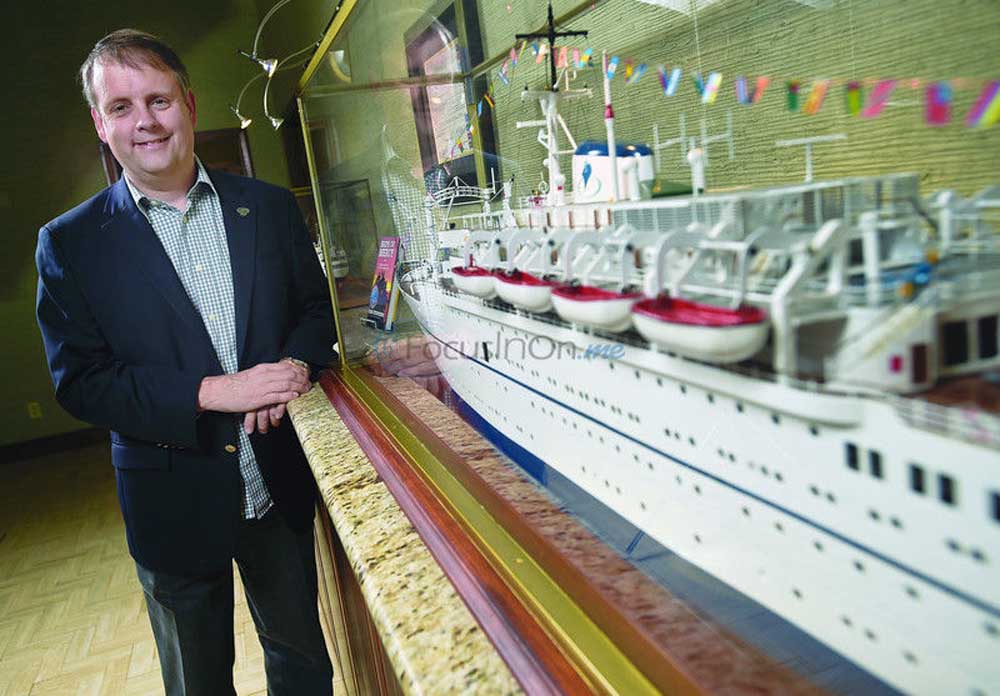Mercy Ships’ managing director talks about his journey, organization’s future
Published 10:50 pm Saturday, December 5, 2015

- Donovan Palmer, group managing director overseeing operations of Mercy Ships, poses with a model of the Anastasis on Tuesday, Oct. 13, 2015, at the organization's headquarters in Garden Valley. A long-time family friend of Mercy Ships founder Don Stephens, Palmer first volunteered with Mercy Ships, before being tapped to head up the day-to-day operations. Andrew D. Brosig/Tyler Morning Telegraph
Q: How did you get connected with Mercy Ships?
A: I was doing relief projects out in old Soviet Central Asia and my parents knew of the founders, Don and Deyon Stephens … and as I was working on these projects, I thought, “Wouldn’t it be amazing to do this stuff on ships? Have the ability to move a lot of people and resources to go work on projects somewhere in the world in need.” And I heard that Mercy Ships was going to build another ship so I made an inquiry and said, “Hey, if you guys are (going to) build another ship, I’ve got a love for relief and development, helping people out. Can I give you guys a hand?” And they said, “Yes. Let’s go for it.”
Trending
Q: Did you have any experience with the maritime world?
A: No, that’s the irony of it. I grew up in Colorado. I hadn’t seen the ocean. I didn’t see the ocean until I was 18 and so we (my wife and I) sometimes joke that God has a sense of humor. What is a Coloradoan who hasn’t seen the ocean ’til he was 18 doing on a ship?
Q: Looking ahead, what do you see as some of the challenges facing this organization?
A: What I do see coming in Africa is a growing complexity to some of the issues that we need to address as it develops, which means we need very specialized skills to come to Mercy Ships to volunteer. … We need very specialized people to help us out with very specific problems in a country so that we can help them go as far as possible. So that’s probably one of our biggest challenges.
Trending
Q: What has been the secret to the longevity and success of this organization?
A: I think a couple of things, a few things. Don and Deyon are very unique people and have attracted some great people over the years to motor Mercy Ships forward, but I also think that Don and Deyon in that have been very clear about what our foundations are. We are a faith-based organization and we have some very, very clearly defined values, which we really try to not just speak about but live.
Q: What makes the people on the ship become like family?
A: Well, I think that you know our motto or mission statement is we follow a 2,000-year-old model of Jesus and I think as we look to His example of laying His life down for others, of His teachings, of loving your neighbor more than yourself, that sort of thing … we get to work out how that works among us first.
Q: How often do you work with nongovernmental organizations?
A: We work a lot with other organizations. Sometimes they’re faith-based sometimes they are not. It depends on what they bring to the table, where we have common points of interaction. … Partnership is very, very important to us because we can’t cover the whole spectrum, nor do we want to.
Q: What will the addition of the new ship, which is under construction, mean for the organization and what it’s able to do?
A: The new ship takes the lessons we learned from the Africa Mercy, and of course the Africa Mercy built on our ships prior to that, but it takes the lessons we learned and amplifies that, particularly in the area of training capacity building. The Atlantic Mercy (the new ship) … will have greater ability to act as a teaching hospital. So we’re very excited about that.





